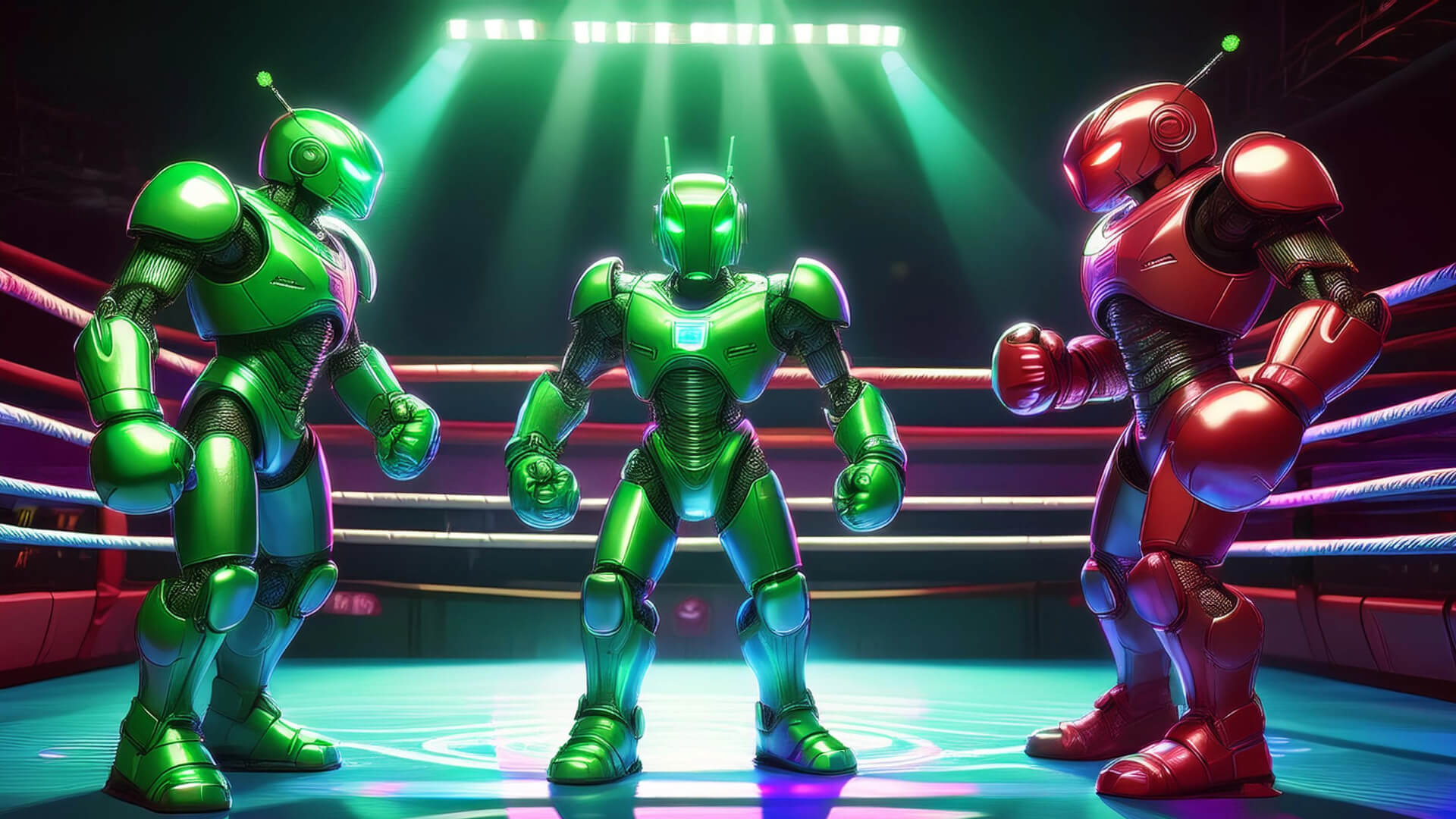
Is RIAAnticompetition Hiding In Plain Sight?
Suno Wrestling Is Getting Intense

Written by Mattske // July 23, 2024 (Read Time: 15 Minutes)
SUMMARY
Listen & Learn
 In no way am I here to defend Suno specifically, especially because I do not know everything about their business practices, back-end coding, or what outputs have been created & monetized using their service. However, there are aspects of this case which seem clearly out of touch with the reality of how music is made, heard, and learned from – by both human beings and machines – which is the crux of the litigation as it stands. My interest is less related to whether or not a company like Suno can operate as they have currently been on course to do, than it is to demonstrate how currently the recording industry has an incentive to suppress the discovery and development of new musical artists in favor of their existing and aging catalogs.
In no way am I here to defend Suno specifically, especially because I do not know everything about their business practices, back-end coding, or what outputs have been created & monetized using their service. However, there are aspects of this case which seem clearly out of touch with the reality of how music is made, heard, and learned from – by both human beings and machines – which is the crux of the litigation as it stands. My interest is less related to whether or not a company like Suno can operate as they have currently been on course to do, than it is to demonstrate how currently the recording industry has an incentive to suppress the discovery and development of new musical artists in favor of their existing and aging catalogs.
Sampling Deja Vu
In the 80’s & 90’s there was a movement to suggest that sampling of previously recorded works was theft, and in part, that is true. If I produce a work of music, and another artist or producer finds it, samples the exact recording, and re-releases it in such a way that it’s obviously unchanged, without even so much as contacting me to ask nicely if they can use it for free, that’s clearly theft. When artists steal music like this and they make no money from it, that is still theft and may result in damages as well.  You can’t even re-record yourself playing parts of a song that I’ve made. But at this point there are certain things like drum beats which are so classically sampled and used in songs, that the originators of those beats no longer pursue litigation based on that fact. Drums are one of those things which can be challenging to make with such original compositions since straying too far from what is rhythmically pleasing results in music that is either completely non-musical, or presents challenges in songwriting.
You can’t even re-record yourself playing parts of a song that I’ve made. But at this point there are certain things like drum beats which are so classically sampled and used in songs, that the originators of those beats no longer pursue litigation based on that fact. Drums are one of those things which can be challenging to make with such original compositions since straying too far from what is rhythmically pleasing results in music that is either completely non-musical, or presents challenges in songwriting.
For example, a “4 to the floor” beat cannot be copyrighted, since the playing of a bass drum on all 4 beats of a 4/4 time signature is too standard and simple of a thing to do. There are plenty of other Hip-Hop break-beats which producers can sample or re-make themselves that may have been made famous by certain songs, but they aren’t actually defensible as copyrighted work anymore. It has become effectively public domain. Chord progressions in principle are the same. In music theory there is something known as the “circle of 5ths,” which is a sort of rule that suggests if you change chords from one to the other in a certain progression, it will sound good to most people. The length of time and rhythm with which an artist changes these chords may ultimately be something that one can copyright, but playing a C chord on the guitar and then a G chord, and then a D chord, cannot be copyrighted alone.
Tom’s Petty Lawsuit & Amy Winehouse’s Cold Case
If you’re familiar with the lawsuit between Tom Petty & Sam Smith, this can be seen clearly. In the song “Stay With Me,” Sam Smith used the same chords as Tom Petty did in his song “I Won’t Back Down,” and Sam Smith was sued over this. He lost the case, unfortunately. At most, Sam Smith or somebody on the production team was aware of the Tom Petty song, but they took so many original liberties with their own production, it is odd that the Heartbreakers felt they were entitled to any royalties whatsoever from the Sam Smith project. The pacing of the songs is different, the chorus of voices in Sam Smith’s song adds many other harmonies to the alleged sequence that Petty’s team believed was stolen from them, and the tone of the songs are completely different. Tom Petty’s song is about when the world beats a person down, they should stand up for themselves. Sam Smith’s song is about begging a lover to remain in a relationship. The amount of overall differences are immense, and nothing about Sam Smith’s song appeared to attempt to take advantage of an audience believing it was in any way similar to the Tom Petty song. That’s the difference.
The other day my wife was listening to Amy Winehouse, and one of her songs came on: “Back To Black.” This is one of the notable songs in her iconic catalog. Listen to the first few bars of this song. Then stop the record before Amy starts singing. Now listen to the Foreigner song “Cold As Ice.” Listen to the lyrics when the singer starts singing them. Now go back to Amy Winehouse’s “Back To Black.” The chord progression is the same. The bpm is slowed down, it’s arranged differently, and in no way does Amy Winehouse try to sing the same song. There are so many clear differences, yet these two songs sound much more similar to one another than Sam Smith’s song and Tom Petty’s song. Yet, for whatever reason, the Amy Winehouse record was never considered a problem and her label was never sued over this.
Why this is an issue, is because what the major record labels are inadvertently litigating here, is the idea of inspiration being illegal. A human being has every right to hear songs, including for free (on advertising-supported channels as old school as the terrestrial radio) and then learn from them. The record company is owed no more royalty or money from any listener who decides to break down the bpm, key, chord progressions, melodic lines, instruments in the arrangement, mixing techniques, etc. (even if they use software to help analyze these things) so long as the listener does not steal the master recording or distributed copy of the work in their own original music.
In other words, if I listen to “Back To Black,” and “Cold As Ice,” and decide to make a song with the same chord progression, played on a piano, with old school lounge-style mixing techniques, and a falsetto male vocalist in a song called “Back To Ice,” there is nothing that the record company can do other than not sign me. But there is nothing illegal about that. The music goes into my ears, gets “copied” to some extent in my brain, and then I am influenced based in my own music. If that is illegal for a machine to do, it should be illegal for a person to do. Obviously this is not illegal. So what is happening? Record companies are afraid that this technology is going to be able to empower people to make better records faster than the aging catalogs which these record companies currently represent and the public will move on from what have been considered icons as we charge forward into a new generation of musicians.
Theft of Originality
New technology also isn’t required to steal songs’ protectable concepts the way these record companies are talking about. A person, lacking in creativity or capacity with music-making, could also listen to a classic record, and take 0 of their own original liberties with it, effectively copying the record. The truth is that if you listen to a lot of current pop music, especially in the Hip-Hop genre, you will find few things that you could call original. The beats sound the same, the chord progressions and keys are essentially the same, and samples are recycled over & over again until they completely lose all meaning. Even the names of artists in this genre are the same, having so many of them be “Lil” something, or “Young” somebody, to the point that there are (2) artists who have the name “Baby” in their name: Da Baby, and Lil’ Baby. T-Pain has a classic rant about this, if you are inclined to hear another professional in the industry explain why something about this seems to point to a lack of overall industry-wide creativity.
Tonight We’re Gonna Party Like It’s 1997
Artificial intelligence has also become an integral part of pop music making since 1997 and nobody seems to care. Early on there was a lot of anger about it, but only because it seemed to make less talented artists more capable. The AI I’m talking about is affectionately known as “auto-tune,” even though there are several other brands and plug-ins which can achieve the same result. Essentially what these programs do is they are tuned to a certain key, given parameters with how often or aggressively to change the pitch of the singer’s voice, and then with AI, it calculates how to do this in a musical fashion. It reacts to your voice. Some artists have became known for using it in a gimmicky way, but nearly every single pop record you know used it to some degree to smooth out the imperfections in a singer’s voice. 
Every single one of the songs that the plaintiff record labels have released in the last 20+ years which they plan to protect, likely used this technology. 0 of the records they have in their catalogs from prior to 1997 could have used this kind of technology so that is also why those songs sound like they come from a different era. It is clear to basically anybody who hears these things, though the more informed listeners recognize why. Similarly, Frank Zappa was once interviewed about the use of computers (samplers, recording devices, etc) in his music even as early as the 1970’s to which he said it was wonderful because it helped eradicate the difficulty of working only with human musicians as he said they can be “unreliable.” Zappa wasn’t only talking about human artists being unreliable to play things well, he meant that as a group, musicians can be often unreliable to show up at all, or on time, and their personalities can get in the way of the art of making music itself. Machines don’t have those attitudes which might drive a producer insane, and there are plenty of artists who generally make music by themselves, then take their work to an engineer to make it presentable to the mass public. This is nothing new, and record companies trying to hold this up may win these lawsuits but ultimately waste their time, and distract people from what should be at issue which is enabling human creativity.
Playing Too Nicely Together In The Sandbox
The biggest problem that this lawsuit actually represents is the glaring anticompetition staring us all in the face. All (3) major record labels are on this single lawsuit together – unified by the RIAA. Each label could have taken it upon themselves to sue Suno individually, demonstrating similar points, hoping to win their own damages or deals. The fact that they joined forces shows just how lacking in competition the record industry really has, at the highest levels. When you take into account the fact that major streaming services have large-scale deals with all the major record labels, and if you have ever attempted to make it as an independent artist (meaning without the support or assistance of these companies) what you will find is that there is a staggering amount of resistance & suppression.
 I believe the real loser in this case will be independent artists. It may likely force Suno to work with the major record labels – by court-order – which will only serve to further entrench their already impenetrable position in the market. There is a fault to the plaintiffs’ premises. The market must recognize that they should be more true competitors, because they are acting like subsidiaries of the same conglomerate, as they pretend to speak for everybody in the industry.
I believe the real loser in this case will be independent artists. It may likely force Suno to work with the major record labels – by court-order – which will only serve to further entrench their already impenetrable position in the market. There is a fault to the plaintiffs’ premises. The market must recognize that they should be more true competitors, because they are acting like subsidiaries of the same conglomerate, as they pretend to speak for everybody in the industry.
This lawsuit is farcical on its face, being that the major record labels have outed themselves as having a lack of competitive animosity towards one another. Secondly, if human beings are capable of listening to, learning from, and in some ways lawfully emulating past recordings or productions, then there is absolutely no reason to suppress the right of a machine or its operators to do the same thing. In fact, many producers commonly will pull in “reference tracks” to their sessions in order to assist their ears in coming up with music and a mix that fits into the modern canon of sounds and recorded music. If digital audio workstations are not being sued for allowing and enabling this, then why should Suno be sued for teaching its machine-enabled music production company from producing content for its users? It’s just referencing tracks.
Here’s something else that people should think about: how long do you think it actually currently takes to produce a “hit” song, and how long will it take with the assistance of AI? If you prompt an AI with 1 sentence, and simply take the song it generates, that is not a copyright-able work anyway, since it was not yet adjusted by human beings. Therefore, nothing that Suno currently produces could be considered copyrighted by any user, and as such, demonstrates a lawful limitation on their existing model (as it is being presented in court). In other words, nobody should assume that they can produce a hit song in 1 minute when an average hit song may take 40+ hours of several human beings’ time. Perhaps with AI one day this could be cut down to more like 4+ hours, which would be incredible. However, that remains to be seen, and the ways in which this technology could be used has yet to even be demonstrated.
You Might Want AI To Learn How To Detect Knock-Off Songs
There should be a larger conversation about the lack of competition in the recording industry, and there are much more debilitating structures in our society that stand in the way of human creativity more so than a software company which enables people who have limited talent to produce works of art they can’t even fully use yet. I believe that the broader issue here is that people still don’t have a firm philosophic comprehension of what artificial intelligence is, what it is & isn’t capable of, how it differentiates from the human functions or acts of creativity, and what we as an artistic enterprise or industry should expect to use it for.
Here are different ways that artificial intelligence could be used in the analysis of existing songs that would require it to “listen” and learn, but not “copy” as the lawyers for these record companies have asserted: 
- Detection
- Key
- BPM
- Chord Progression
- Standard Rhythms/Beats
- Similarity Analysis
- To Existing Works
- To Other Works By An Artist
- Genre Conventions
- Performance Support
- Recognizing & Rejecting Poor Quality Recordings
- Lyrical Comprehension & Demonstrating “Musical Fit”
All of these are things which human beings in a production context must be capable of doing, that are in some ways removed from whether or not a song sounds like any other song in particular. It would also be beneficial for a software to be trained on existing recordings in order to actually prevent theft or copy-catting. I can imagine an advanced AI which could tell you just how similar your song is to another existing song, including the threat of litigation which may come upon you given the potential for protected work being copied. It may never be perfect, but this is an even more beneficial product capability than what Suno appears to offer.
This is one reason why the major record labels can’t be solely responsible for changing the legal ramifications of “learning” or what they call “copying,” because it is possible they simply embed threats of litigation against people for making music with unprotectable frameworks like chord progressions or drum beats.
Facing The Music
If record companies were truly interested in fairness & protection, they would be focused on creating these kinds of solutions, rather than complaining in court that their “enviable” work is being copied, when it is technically not being copied as they say, and they are under no threat whatsoever with respect to music production given their actual anti competitive advantage still exists in the distribution & exploitation of music.
 During the week or so it’s taken me to write this article, the RIAA record conglomerates filed another lawsuit against Verizon. The exact nature of the litigation as presented is not as important to me, as the fact that they’re at it again. These companies should all have slightly different interests, and working within a trade organization to “protect” them all, while 0 independent record companies are getting the same treatment sends a very bold message that nobody is really talking about.
During the week or so it’s taken me to write this article, the RIAA record conglomerates filed another lawsuit against Verizon. The exact nature of the litigation as presented is not as important to me, as the fact that they’re at it again. These companies should all have slightly different interests, and working within a trade organization to “protect” them all, while 0 independent record companies are getting the same treatment sends a very bold message that nobody is really talking about.
In summary, these record companies appear to be protecting their anticompetitive stranglehold on music distribution, exploitation, and production, rather than what their lawsuit alleges, which is the protection of their existing catalogs which nobody appears to be attempting to copy. Whether this is a result of the technology being new and unclear, or if it is fixed litigation to suppress competition, only time will tell. In the meantime, I encourage people to look elsewhere for the real problems that are holding back entertainment & the arts as an industry from fully thriving in the new age of artificial intelligence.
• ChatGPT Recap •
Suno Controversy
- Suno: A music tech company sued by major record labels.
- Issue: Suno’s AI technology could help new artists, threatening the old music catalogs controlled by these labels.
Historical Context of Sampling
- Past View: Using parts of other songs without permission was seen as theft.
- Current View: Common beats and chord progressions, like a “4 to the floor” beat, can’t be copyrighted because they’re too standard.
Notable Cases
- Tom Petty vs. Sam Smith: Sam Smith was sued for using similar chords to Tom Petty’s song. Despite many differences, Smith lost the case.
- Amy Winehouse Example: Amy’s song “Back To Black” has a similar chord progression to Foreigner’s “Cold As Ice.” Despite the similarities, there was no lawsuit, showing inconsistencies in handling such cases.
AI in Music
- AI Tools: Tools like auto-tune have been used since the 90s to improve music.
- Impact: These tools help make music production smoother and faster.
Record Labels’ Motives
- Collaboration: Major labels working together show they want to maintain control over the music industry.
- Anti-Competitive Behavior: By joining forces against Suno, the labels are acting in a way that could be seen as illegal collusion, which is against competition laws.
Competition Issues
- Lack of Competition: Independent artists struggle because big labels have too much power and influence.
- Impact on Innovation: The lawsuits could force companies like Suno to work with major labels, limiting innovation and new talent discovery.
Conclusion
- Lawsuit Motives: These lawsuits seem more about protecting the labels’ power than stopping copying.
- Future Focus: It’s important to make the music industry fairer and more open to new artists and technologies, and to address the potentially illegal collusion among major labels.
